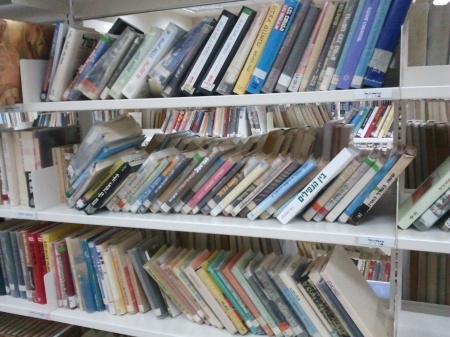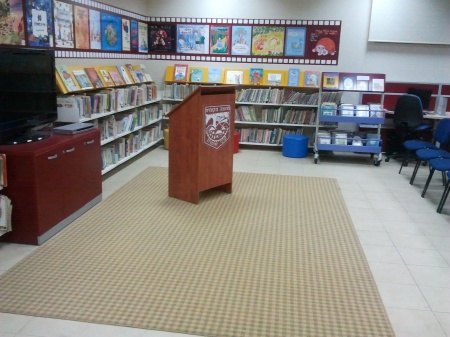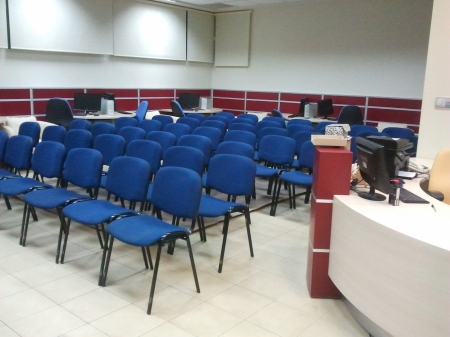12. לאור ההתנסות שלך בפייסבוק הסבר כיצד בפייסבוק מיושמת היטב האסטרטגיה בה מבקשים ספריות לנקוט היום: “אם המשתמש לא בא אל הספרייה הבא את הספרייה אל המשתמש” .
אני הולכת לכתוב משהו בכיוון האפיקורסות, ואולי משהו קצת סקיצופרני: אני חושבת שהאסטרטגיה שציינת היא שגויה. מאד שגויה.
קחי בחשבון ממי זה מגיע: רוב החיים שלי מתנהלים באון-ליין. אני עובדת מרחוק דרך המחשב. מדברת עם השכנים שלי דרך אי-מייל, פייסבוק, וטוויטר. לוקחת 2/5 מהקורסים שלי במתוקשב. הדבר הראשון שאני עושה בבוקר, לפני שאני מרכיבה משקפיים, זה לבדוק ג’י-מייל, והדבר האחרון לפי קריעת שמע זה לקרוא ebook.
יש שירותים שאני מודה שמשתלבים טוב באינטרנט — הערכת ספרים, יעץ קל. לא חייבים סינכרון בין הספרן ללקוח, ואין צורך לספק את השירותים בשעות עומס, למשל. מצד שני, יש שירותים שהם לא כל כך יעילים במתוקשב — הדרכה, למשל. ויש לי חשש שאנחנו, דור המחשבים ממעמד הבינוני + נסחפים בזרם ה”ספרייה 2.0″ ושוכחים מה כל כך חשוב בספרייה 1.0.
“אם המשתמש לא בא אל הספרייה הבא את הספרייה אל המשתמש”. ונעשה את זה דרך בלוגים וקטלוג מכוון וטוויטר וebooks ופודקאסטים ושאר ירקות. יופי. בספרייה האקדמית? מעולה. בספרייה של חברה? פרפקט. בספרייה של בית חולים, איפה שחולים שוכבים במיטות והמשפחות עסוקות איתם? כשיש גישה מוגבלת לרשת, או שהגישה בתשלום, או שהיא נמצאת רק במקומות מסויימים בבניין? יפה, כבוד הרופא, שאתה אומר לי “תבדקי באינטרנט ותמצאי הרבה חומר על המחלה של בעלך.” אולי במקום זה תעזור לי ליצור קשר עם הספרן של בית החולים ושהספרן יביא לי כמה כתבות או תמצית ממה שהוא מצא באינטרנט? אתם באמת חושבים שעכשיו יש לי זמן לשיטוטים וחיפושים? וספרייה ציבורית — לאיזה חלק מהקהל יש גישה למחשבים, לאינטרנט, וידע מספיקה להרוויח מהנוכחות של הספרייה ברשתות חברתיות?
לאחרונה הייתה הרבה דיבורים על העתיד של הספרייה — סט’ גודין, קרן קוייל, וקולות חדשים כמו לי-אן וראבל. ומכל הקולות עולה החשש שאנחנו לא יודעים איך לשלב הספרייה כפי שהיא תמיד הייתה והמשחקים החדשים שלנו. ואני חושבת — אם אנחנו לא מבקשים מהלקוחות להגיע עלינו, למה לנו בניינים ותחזוקה ומשכורות? למה שלא נסגור את הבאסטה, נלמד לכמה הודים ממומבאי עברית, ושהם יטפלו בחשבונות של הספרייה ברשת/יתנו שירותי יעץ?
אז מה אני מנסה להגיד — שאין מקום לרשתות חברתיות בספרייה? ברור שלא. לדעתי, אין כמעט אמצעי פסולה במאבק שלנו לתשובת לב הלקוח. אבל אני כן חושבת שהאסטרטגיה חייבת להיות “אם המשתמש לא שם לב לפרסומות של הספרייה הבא את הפרסומות אל המשתמש.”
בטמבלר בא נשים תמונות של ספרים חדשים שנרכשנו, עם לינק שהלקוח יזמין את הספר — ויבוא לקחת.
נזכיר בטוויטר דברים שקורים בספרייה, ואפילו נעשה לייב-טוויטינג’, שיראו כמה כיף הם מפסידים אם הם לא מגיעים לאירועים שלנו.
בפורסקוור בו ניתן באדג’ים לאילו שמגיעים לספרייה בתדירות.
בבלוג, בא נעלה טעימות של שלל הדברים החדשים שאנחנו מציעים — ספרים, מוסיקה, הרצאות. למה לא לשים עוד פוקוס על האוסף ונחדד את התיאבון ליותר מידע בזה שמזכירים למשתמש שתמיד, תמיד, יש לנו עוד מה להציע לו, בכל נושא שירצה?
בא נשתמש בפודקאסטים ווידקאסטים לבנות קהילה. נראיין משתמשים, במיוחד עלה שמשתמשים כבדים של רשתות חברתיות, והם יעלו לינק לקאסט, וככה הספרייה יפיץ את עצמה באופן וויראלי.
בפייסבוק, בא נעלה קישוריות לחדשות — עם ההקשר לספרייה שלנו. וודיאוים מויטויב, ואיזכור שהספר שממנו נסרט הסרט, המוסיקה מאחורי הוויד, נמצאים אצלנו למי שרק יגש ויקח.
הרשתות החברתיות, לדעתי, חייבים להיות תחליף לפרסומת ולא תחליף לספרייה.
ואחרי כל ההקדמה המתישה הזאת, כמה ספריות שעושות את זה נכון בפייסבוק ולמה:
ספרייה אזורית קולומבוס: שאלות יעץ, אירועים בקרוב, ביקורת על ספרים שיש בספרייה, בקשות מקוראים לרכש, איגוד של פוסטים מיישומי ווב 2.0 (בלוגים, טוייטר), תמונות, סרטי הדרכה לשימוש בספרייה, ועוד. יש תחושה שהם עובדים קשה לבנות קהילה לספרייה הכוללת גם צוות וגם קוראים.
ספרייה לאומית, ישראל: חדשות הספרייה, שאלות ותשובות, דיונים, והמלצות קוראים לספרים הנמצאים באוסף. רק חבל שיש דפים נפדרים לעברית ולאנגלית, וכל אחד עם תוכן אחר, כך שמי שרוצה תמונה שלמה חייב לקרוא את שתי הדפים.
הספרייה הציבורית סיאטל: דיונים על ספרים באוסף, תזכורות על שירותים בניתנים מרחוק עם כרטיס קורא, קבוצות קריאה, שירותי יעץ, שאלות טכניות וביקושי רכש לספרנים, תמונות מאירועים. בונים פה קהילה, אבל עם הדגש חזק על הגעה לסניפי הספרייה.
ספריית קוונס קולג’ אוקספורד: מידע על רכש, שינויים בשעות, דברים יוצאי דופן שקורים בספרייה (הסרטה של סרט בוליוודי, למשל), שירותי און-ליין למשתמשי בספרייה, גישה לוורלדקט וסייט מי. חבל שאין יותר מעורבות מצד הקורים.
ספריית אונ’ של מרכז פלורידה: הרבה מעורבות של קוראים. אין הרבה מידע על הספרייה עצמה, אבל הדף יוצר רושם שהספרייה היא מקום קולית להיות בו, ושזה מקום שבו ניתן לצמוא את החברה’.
ספריית עיריית נוי יורק: מידע על אירועים, הנחות למשתמשים של פייסבוק, תחרויות מיוחדת, מידע על האפליקציה של הספרייה, קישורים לאתר של הספרייה, ותמונות, וידיאוים, מידע והשראה לספרנים מספריות אחרות, לינקים לרשתות חברתיות אחרות, לייבסטרים של אירועים, וורלדקט ועוד.
כל הספריות האלו בונים קהילה דרך הכלים של פייסבוק וגם מנסים לעשות את הספרייה עצמה — המבנה הפיזי — אטרקטיבי למשתמשים כדי לעודד ביקורים ושימוש. השבת קראתי ספר על הספרייה הציבורית במאה ה21*, ושם כתוב (דף 115) שקיימת חשש שהצעירים המובילים טרנדים לא משתמשים בספריות ולא מושכים איתם הצעירים שעוקבים אחרי טרנדים, וכמה חבל זה, כי משתמשים צעירים ונהלבים הם קצובה שמוכנה וזמינה להיות אקטיביסטים למען ספריות. נראה לי שזה השימוש הכי חשוב שספריות יכולות לעשות ברשתות החברתיות — להגיע ליוצרי דעות צעירים איפה שהם נמצאים ולהפוך אותם לאוהדי הספרייה.
———————
* Goulding, A. (2006). Public libraries in the 21st century: defining services and debating the future. Hampshire, England: Ashgate Pub Co.






 View from the admin/check-out desk through the kids’ library to the YA, reference, English, and adult section.
View from the admin/check-out desk through the kids’ library to the YA, reference, English, and adult section.




